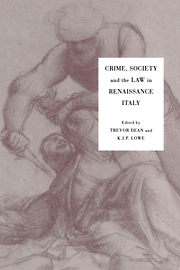Book contents
- Frontmatter
- Contents
- Illustrations
- List of contributors
- Preface
- 1 Writing the history of crime in the Italian Renaissance
- 2 Criminal justice in mid-fifteenth-century Bologna
- 3 The judicial system in Florence in the fourteenth and fifteenth centuries
- 4 The incidence of crime in Sicily in the mid fifteenth century: the evidence from composition records
- 5 Theology, nature and the law: sexual sin and sexual crime in Italy from the fourteenth to the seventeenth century
- 6 Practical problems in the enforcement of Italian sumptuary law, 1200–1500
- 7 The prince, the judges and the law: Cosimo I and sexual violence, 1558
- 8 Intervention by church and state in marriage disputes in sixteenth- and seventeenth-century Florence
- 9 The writer and the man. Real crimes and mitigating circumstances: il caso Cellini
- 10 The political crime of conspiracy in fifteenth- and sixteenth-century Rome
- 11 Fighting or flyting? Verbal duelling in mid-sixteenth-century Italy
- 12 Banditry and lawlessness on the Venetian Terraferma in the later Cinquecento
- 13 Mihi vindictam: aristocratic clans and rural communities in a feud in Friuli in the late fifteenth and early sixteenth centuries
- Index
4 - The incidence of crime in Sicily in the mid fifteenth century: the evidence from composition records
Published online by Cambridge University Press: 14 October 2009
- Frontmatter
- Contents
- Illustrations
- List of contributors
- Preface
- 1 Writing the history of crime in the Italian Renaissance
- 2 Criminal justice in mid-fifteenth-century Bologna
- 3 The judicial system in Florence in the fourteenth and fifteenth centuries
- 4 The incidence of crime in Sicily in the mid fifteenth century: the evidence from composition records
- 5 Theology, nature and the law: sexual sin and sexual crime in Italy from the fourteenth to the seventeenth century
- 6 Practical problems in the enforcement of Italian sumptuary law, 1200–1500
- 7 The prince, the judges and the law: Cosimo I and sexual violence, 1558
- 8 Intervention by church and state in marriage disputes in sixteenth- and seventeenth-century Florence
- 9 The writer and the man. Real crimes and mitigating circumstances: il caso Cellini
- 10 The political crime of conspiracy in fifteenth- and sixteenth-century Rome
- 11 Fighting or flyting? Verbal duelling in mid-sixteenth-century Italy
- 12 Banditry and lawlessness on the Venetian Terraferma in the later Cinquecento
- 13 Mihi vindictam: aristocratic clans and rural communities in a feud in Friuli in the late fifteenth and early sixteenth centuries
- Index
Summary
A study of Sicilian crime in the middle decades of the fifteenth century must of necessity be impressionistic because the judicial records have disappeared. Allied aerial bombardment, followed by civilian pillaging of anything that would burn during the bitter winter of 1943, destroyed some 35,000 volumes of the central Sicilian archives in Palermo; among them were the court records. We are left dependent on fragmentary notarial archives and incomplete administrative series that touch only incidentally upon matters criminal. With patience much might be extracted from the protonotary registers, but, given the opening hours of the Palermo archives, that task might take literally years. Close on one hundred Commune registers relating to Sicily during the reign of Alfonso I (1416–58) which are housed in the Aragonese chancery archives in Barcelona and Valencia would also repay study. For this brief excursion into the field I have relied mainly upon the Sicilian treasurer's final accounts. Although only few survive, they provide as it were a series of snap-shots of the scene of crime taken from the same vantage point over a number of years. What they give us is a record of all payments made to the crown in a fiscal year – running from 1 September to 31 August – as composition for the whole gamut of criminal offences.
In order to evaluate the data some demographic and institutional background is needed.
- Type
- Chapter
- Information
- Crime, Society and the Law in Renaissance Italy , pp. 59 - 73Publisher: Cambridge University PressPrint publication year: 1994
- 1
- Cited by



